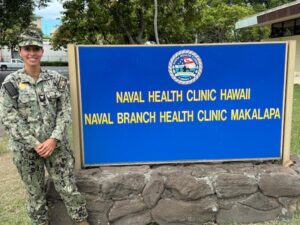When the 19th amendment was ratified on Aug. 26, 1920, millions of women across the country won the right to vote. On Women’s Equality Day, we honor the hard-fought quest for universal suffrage and celebrate the monumental progress women have made over last century.
In the lead up to Women’s Equality Day on Aug. 26, we are highlighting some of the exceptional women at Commander, Navy Region Hawaii (CNRH) who did not let their gender stand in the way of achieving their goals.
This week we interview Hospital Corpsman 2nd Class Lizeth Istre, 25, a behavioral health technician for the Navy Medicine Readiness and Training Command on Joint Base Pearl Harbor-Hickam.
Before Istre joined the Navy five years ago, she worked in the Chicago area as a substance abuse counselor at OMNI Youth Services, a non-profit that offers counseling, youth development and community outreach services, 24-hour crisis intervention, substance abuse prevention and treatment, family strengthening, and juvenile justice services for 25 communities throughout Chicago’s northwest suburbs. Since many of those who were served by the non-profit came from a Hispanic background, Istre frequently used the Spanish-speaking skills she learned growing up in Huandacareo, Mexico in her role. Istre was the first person in her family of three brothers and her single mother to complete high school, join the military, and attend college. Istre earned a Bachelor of Science in psychology from Liberty University in Lynchburg, Virginia, before she enlisted.
Istre began her naval career with the enlisted classification of HM-0000, known in the medical community as a hospital corpsman quad zero. She enjoyed the initial training to learn general medicine and human anatomy along with hands-on training that included working in a variety of settings such as the lab, the immunization clinic, and family practice. Afterwards, Istre worked in aviation medicine and completed flight physicals with providers and administered female wellness exams, sick call, and periodic health assessments, but she was determined to become a mental health care provider and earned her Master of Arts in applied psychology from Liberty University. She received tuition assistance from the Navy while she worked fulltime as a corpsman. Istre plans to pursue her doctorate in psychology and to become a licensed clinical psychologist and commissioned naval officer.
Istre talked about gender equality, the person who inspires her, and shared advice for young women.
Why is gender equality important?
Gender equality is important because if we allow just men to dictate how women should be treated, how women are supposed to be, we’re falling under what their perception of ideal is versus what we actually need as women. We talk about what it’s like to birth children — I’m not a mother yet — how can a man tell you how to be the best parent or the best mother if you yourself can’t carry a child for nine months?
How has gender equality changed for the better?
Over the years, I’ve seen that change in our [Mexican] culture where there’s more acceptance of women who can actually speak up about concerns around the family, around finances, major decisions of moving from place to place, and anything that influences the family.
In the military, I’ve seen a lot more women who are in leadership roles and because those roles are so important they are the ones making the decisions for us. We can’t just have men making the decisions for all the stuff that affects us, especially when it comes to uniform, hair regulations, and nail regulations.
Name one female figure who inspires you and why.
My mom is my biggest role model simply because the way she was able to raise four children on her own. It was not easy and she made every sacrifice to make sure that my brothers and I were fed after my father left us with nothing. My brother and I stayed in Mexico until she was able to bring us to the States, so she worked in factory jobs most of her life. Now she works in the cafeteria.
What advice can you give young women today?
The advice that I have for young women or women in general is to have their dreams and pursue whatever is on their mind. I don’t think I ever dreamed that I would be able to accomplish a master’s degree with no debt and be as successful as I am with the background that I have, but at some point in my life, I had that vision and that dream. When I had that, I had to start somewhere. My biggest motivation is, if you can dream it and you can see it, then you can achieve it as long as you’re willing to put in the work.
